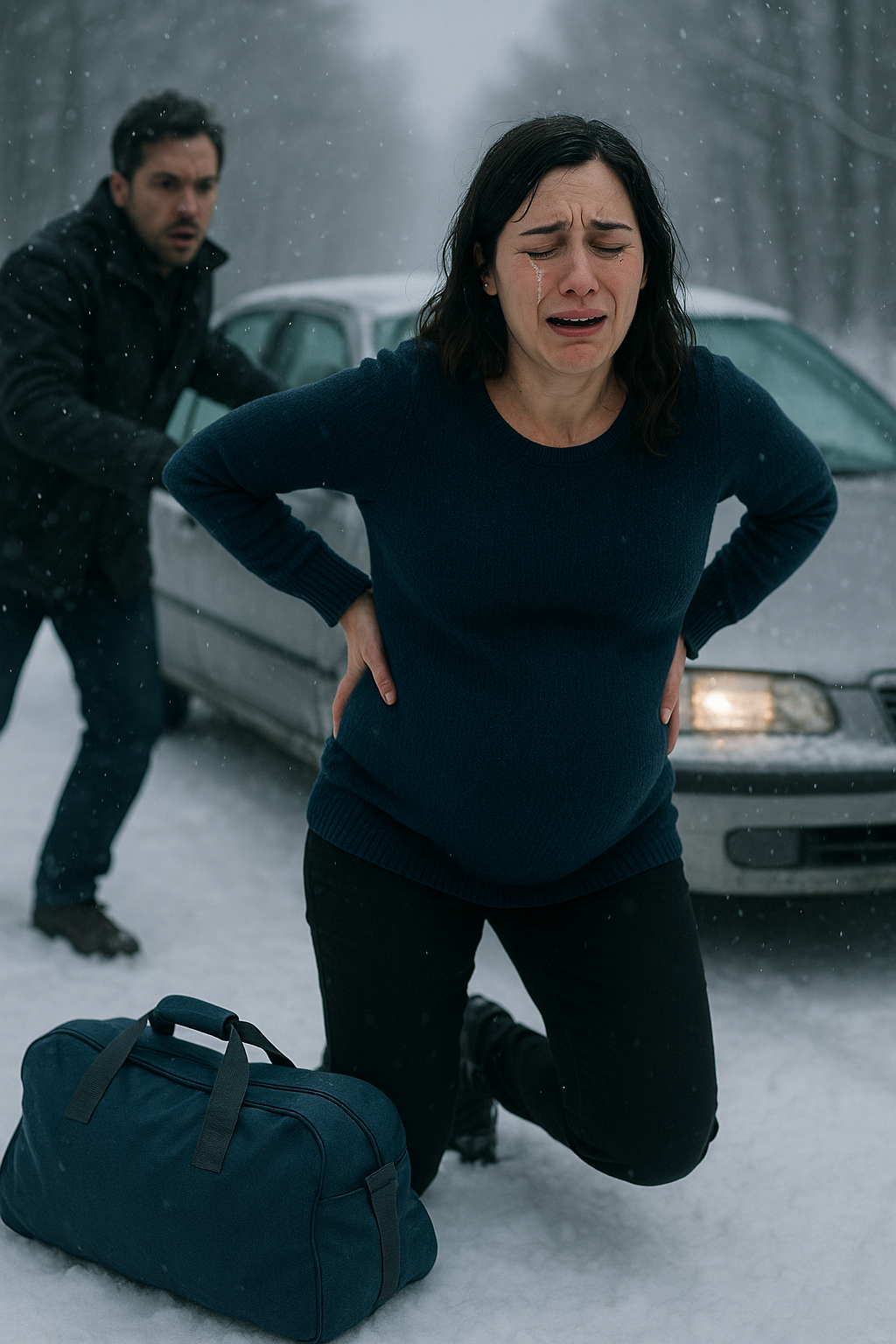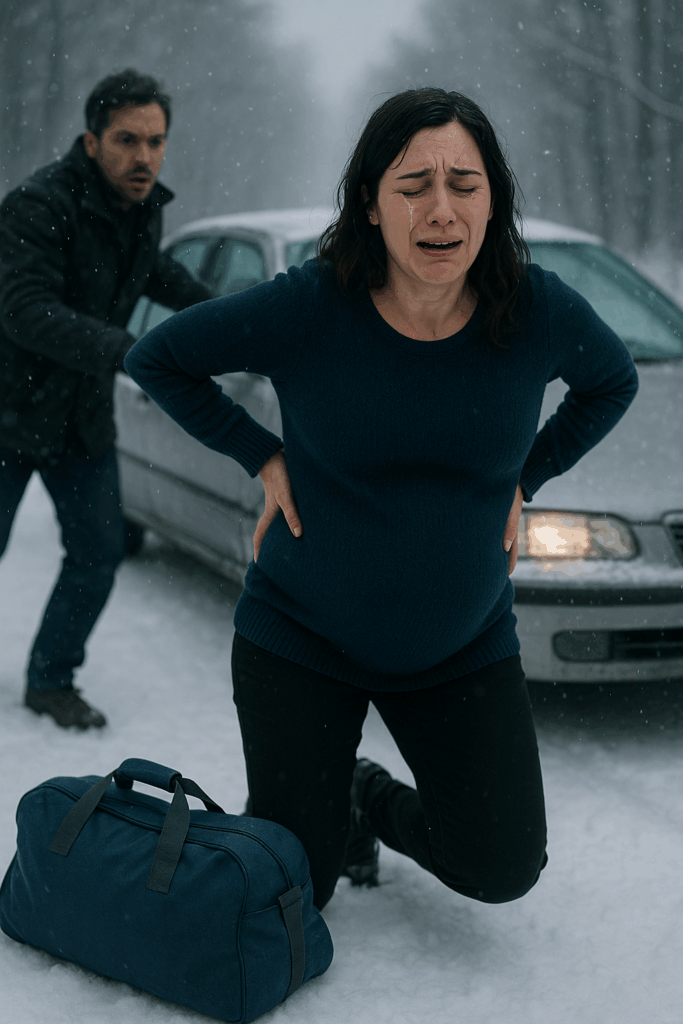The world outside the car window was a blur of white and grey, matching the turmoil churning inside me. My name is Eleanor. I was nine months pregnant, and the sharp, visceral pain that just ripped through me could only mean one thing: it was time. My water had broken.
Beside me, my husband, Robert, stiffened. A silence descended, heavy and foreboding, far more chilling than the blizzard raging outside. I could feel his gaze, a cold, hard stare, even before I looked at him.
“You’re kidding, right?” His voice, usually so smooth and reassuring, was now laced with an edge I didn’t recognize. “Not now, Eleanor. Not on Amelia’s big night.”
Amelia was his sister, and tonight was her lavish 40th birthday celebration, a milestone event Robert had meticulously planned for months, viewing it as a testament to his unwavering loyalty to his family. His sister was, in his eyes, sacrosanct.
“Robert, please,” I pleaded, clutching my belly, another wave of pain washing over me. “It’s the baby. We need to go to the hospital. Now.”
He slammed on the brakes, the car skidding wildly on the icy highway. My head snapped forward, a sharp jolt of fear running through me. He brought the car to a shuddering halt, effectively blocking both lanes of the desolate road.
“You did this on purpose, didn’t you?” he spat, his eyes blazing with an accusation that pierced me deeper than any contraction. “You always try to steal her thunder! You can’t stand it when Amelia is the center of attention, can you?”
I stared at him, aghast. “Robert, what are you saying? This is our child! I can’t control when the baby comes!”
But his face was set, unyielding, a mask of cold resolve. He unbuckled his seatbelt, a slow, deliberate movement that filled me with an inexplicable dread. He stepped out, and the biting wind immediately whipped through the car. Then, he opened the back door, and with a grunt, he pulled out my hospital bag, tossing it into the snow. It landed with a soft, ominous thud.
“Get out,” he commanded, his voice devoid of all warmth, all humanity.
“You can’t be serious,” I whispered, tears welling in my eyes. “It’s freezing, Robert! I’m in labor! You can’t leave me here!”

He leaned in, his face inches from mine, his breath a cold puff in the frigid air. “Amelia’s happiness is more important than your little drama, Eleanor. She deserves this night. You can take care of yourself.”
And with that, he closed the door. The sound echoed in the sudden, vast silence of the snowy landscape. I watched, numb with shock and pain, as he climbed back into the driver’s seat, started the engine, and slowly, deliberately, drove away.
The red taillights, a mocking symbol of his retreating callousness, vanished into the blizzard’s embrace. I was left alone, stranded on an icy highway, in the middle of a raging snowstorm, in active labor, nine months pregnant, betrayed by the man who had promised to be my protector.
Panic, raw and visceral, seized me. A contraction ripped through me, more powerful than any before. I cried out, a guttural sound swallowed by the howling wind. I tried to open the door, but my hands, trembling and numb with cold, fumbled with the latch. My strength was ebbing, replaced by a terrifying weakness.
Just as the despair threatened to consume me, a faint glimmer of hope appeared. Headlights. Far in the distance, a vehicle was approaching. It was slow, cautious, navigating the treacherous conditions. As it drew closer, I could make out the distinctive shape of a large SUV.
It pulled up beside my abandoned car. The driver’s side window rolled down, revealing a woman with striking red hair and a worried frown. It was Amelia.
“Eleanor? What on earth…?” Her voice trailed off as she saw me, huddled and shivering, my face streaked with tears and snow. Her eyes widened, taking in the scene, the hospital bag in the snow, the absence of her brother.
Before I could even speak, another intense contraction hit, and I cried out.
Amelia’s face, usually composed and elegant, crumpled with a mixture of horror and dawning realization.
“Oh my God, Eleanor! Are you in labor?!”
She was out of her car in an instant, rushing to my side. She helped me out, her strength surprising. Her elegant evening gown was quickly dusted with snow, her expensive shoes sinking into the drifts, but she didn’t seem to notice. “My brother… he left you here? In the snow? While you’re in labor?” Her voice was laced with disbelief, then a rising fury. “That bastard! How could he?!”
She wasted no time. With surprising efficiency, she helped me into the back seat of her warm SUV, wrapping me in a cashmere scarf she’d been wearing. “Hang on, Eleanor. We’re getting you to the hospital. Screw Robert, screw my party, screw everything else. This baby is coming, and you need help.”
The forty-minute drive to the nearest hospital was a blur of pain, fear, and Amelia’s surprisingly calm reassurances. She called the hospital ahead, her voice firm and authoritative, demanding immediate attention. She kept a steady hand on my shoulder, talking me through each contraction, her earlier indifference completely gone, replaced by a fierce, protective urgency.
When we arrived, the medical staff was ready. Amelia, ignoring her ruined gown and makeup, stayed by my side, refusing to leave. She held my hand, wiping my brow, whispering words of encouragement.
Hours later, after a grueling labor, my daughter was born. A tiny, perfect little girl with a shock of dark hair, just like her father’s, and the most piercing blue eyes. I named her Hope, for the hope that Amelia had brought me when I was at my lowest.
Amelia held Hope with a tenderness that brought tears to my eyes. “She’s beautiful, Eleanor. Absolutely beautiful.” A profound sadness then crossed her face. “I’m so sorry, Eleanor. For everything. For him. For my part in enabling him all these years.”
It was a quiet apology, but it was genuine. She confessed that Robert had always been the golden child, adored by their mother, and she had often stood by, witnessing his selfish acts, excusing them, sometimes even enabling them, to maintain the family peace. But this act, abandoning his pregnant wife in a snowstorm, was a line he had irrevocably crossed.
Robert eventually learned of Hope’s birth through a news report that detailed the “heroic actions of a sister who saved her sister-in-law and newborn niece from a blizzard.” He called, not with remorse, but with a bewildered sense of injustice, furious that his “important night” had been overshadowed. Amelia, with a calm resolve I’d never seen in her, simply told him, “You’re no longer my brother. And you’ll never meet your daughter, Robert.”
The divorce was swift and final. Robert, ostracized by the very family he had prioritized, eventually faded into obscurity. Amelia, however, became not just an aunt to Hope, but my dearest friend, my confidante, my family. She shed the expectations of her past, embraced a newfound strength, and helped me navigate the challenging world of single motherhood.
Hope grew up knowing only love and stability, surrounded by a fierce, unconventional family. Amelia was a constant presence, a doting aunt who taught Hope about resilience, kindness, and the importance of standing up for what’s right.
Sometimes, on clear winter nights, I still look out at the snow and remember that desolate highway. But the memory is no longer one of crushing despair. It’s a reminder of betrayal, yes, but more powerfully, it’s a testament to the unexpected bonds that can form in the crucible of adversity, the quiet strength of a woman who finds her voice, and the profound, transformative power of redemption.
And the question that echoes in the silence, one I often ponder when I see Amelia and Hope laughing together, is this: When do we truly recognize the monster in the mirror, and what unforgivable act must shatter our perception before we choose to become the hero in another’s story?


